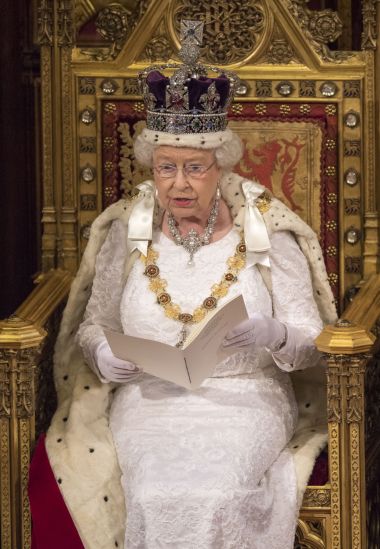We should all be worried about Government's plan to tackle 'extremism'

"Legislation will be introduced to prevent radicalisation, tackle extremism in all its forms, and promote community integration."
Scared yet? Maybe the Queen's familiar, slightly disinterested delivery somewhat masked the meaning of what she'd said, but it has the potential to be very worrying.
We all know what the speechwriters meant. The Government is going to bring forward legislation to try to tackle violent extremism – the kind of extremism which has claimed lives in Paris, Brussels, Baghdad and Ankara in recent months.
That was what they intended, but it wasn't what they wrote for the Queen to say. Instead of specifying the kind of violent Islamist expression of extremism that they are intending to target, we were told that the Government would "tackle extremism in all its forms." For a start, it's incredibly optimistic to presume that violent extremism can be tackeld by legislation. The law is only one tool among many we have to use to persuade young men to take a different course. In fact, by the time the law has to get involved, then it's invariably too late – violent extremism has already taken hold.
Tackling extremism may be a laudable aim in the abstract. But when legislation is brought forward to tackle violent extremism, how can we be sure that the vast majority of peaceful Muslims won't be caught in it? That's before we even get on to the potentially worrying consequences for Christians and those of other faiths whose religious freedom could well come under threat.
Draft legislation was proposed last year which sent chills through various Christian communities. Sunday schools would potentially be vetted by the education regulator OFSTED. Understandably, churches were nervous about this unnecessary and burdensome threat. David Cameron suggested that the Government wasn't planning to allow this to happen. In fact he said, "The Government is not proposing to regulate institutions teaching children for a short period every week, such as Sunday schools or the Scouts... The Government is working closely with the Church of England and other faith communities to ensure that the system is targeted, proportionate and focuses on those settings which are failing to safeguard and promote the welfare of children."
While the Prime Minister's words assured many, the detail of the legislation still hasn't been seen – so there's every chance that when it is finalised, there may still be a threat (however theoretical) that the Government will in some way regulate the teaching in Sunday schools.
There are two main problems here. The first is that freedom of religion and freedom of worship are incredibly important bastions of the wider freedoms we enjoy here in the UK (and the US and beyond). As soon as the Government begins to decide what is and isn't acceptable in religious doctrine, a Rubicon has been crossed. There's an obvious exception, which is for religious groups that are explicitly promoting violence. It is reasonable to expect that the security services will clamp down on any place of religious worship which is actively inciting violence.
Apart from that, the state needs to stay out of the way of regulating religious teaching. We may disagree with what's taught about sexuality at the church down the road, the way that the local synagogue or mosque doesn't allow women to preach and teach or even the more esoteric beliefs of the Mormons, Jehovah's Witnesses and Scientologists who are an increasingly visible minority across much of the US and the UK. Yet asking the Government to step in against them is overkill. They, and we, must retain the freedom to practice and speak about their beliefs, just as much as we must retain the ability to agree and disagree with them. Any semblance of abuse should be rooted out of these communities – but we already have laws to do that.

There's a second problem with the attempt to, "tackle extremism in all its forms," though. It's this: extremism isn't inherently bad. In fact, I'd go so far as to say extremism is the DNA of our Christian faith. Some of my best friends are extremists...
I aspire to be the kind of extremist who loses his life so that he might gain it. Jesus rebukes the outwardly pious Pharisees repeatedly, not because they are extreme, but because their efforts are extreme in the wrong direction. They followed the letter of The Law to extremes, yet they forgot its purpose – to help us love God and eachother.
Christian people around the world are moved to give up huge proportions of their income to support others, to give up vast amounts of their time to support life-changing ministries feeding, clothing and welcoming the destitute. This is the kind of Christian Jesus asks us to be. Lukewarm Christians may feel awkward reading Jesus' repeated challenge to us. And we should!
Martin Luther King cuts through the noise and presents us with a stark choice. In the Letter From Birmingham Jail, Dr King writes one of the most astonishing defences of extremism, "Though I was initially disappointed at being categorized as an extremist, as I continued to think about the matter I gradually gained a measure of satisfaction from the label. Was not Jesus an extremist for love: "Love your enemies, bless them that curse you, do good to them that hate you, and pray for them which despitefully use you, and persecute you." Was not Amos an extremist for justice: "Let justice roll down like waters and righteousness like an ever flowing stream." Was not Paul an extremist for the Christian gospel: "I bear in my body the marks of the Lord Jesus." Was not Martin Luther an extremist: "Here I stand; I cannot do otherwise, so help me God." And John Bunyan: "I will stay in jail to the end of my days before I make a butchery of my conscience." And Abraham Lincoln: "This nation cannot survive half slave and half free." And Thomas Jefferson: "We hold these truths to be self evident, that all men are created equal..." So the question is not whether we will be extremists, but what kind of extremists we will be. Will we be extremists for hate or for love?"
Follow Andy Walton on Twitter @waltonandy











